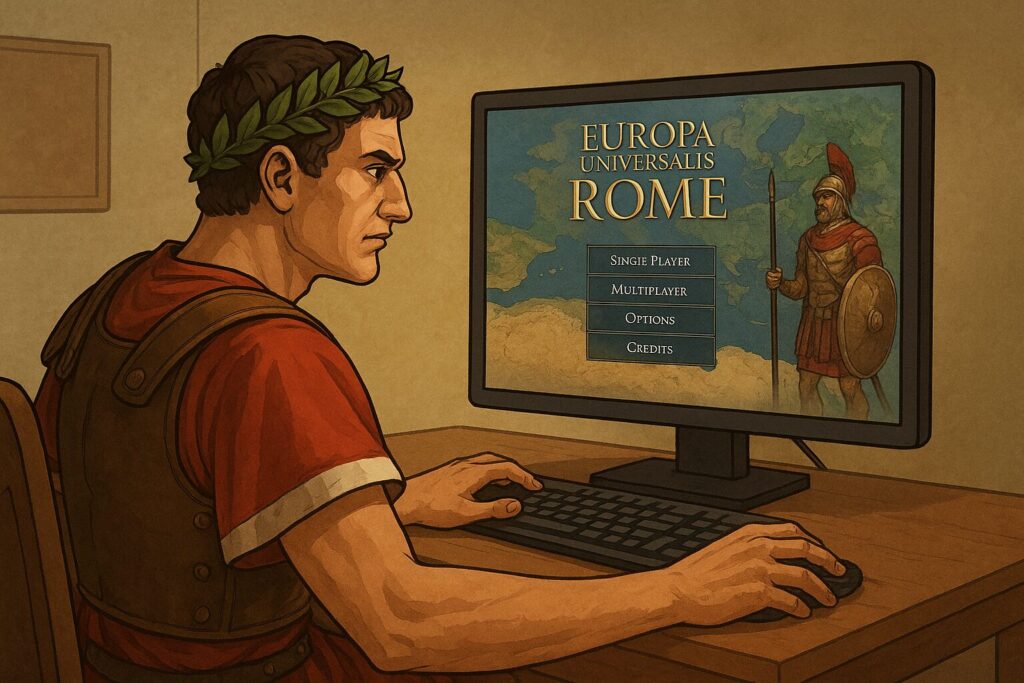Intro
Long before Paradox Interactive became famous for Crusader Kings and Europa Universalis IV, there was an ambitious project that dared to bring the grand strategy formula into the ancient world — Europa Universalis: Rome. Released in 2008, this game offered players the chance to shape or change history in one of the most turbulent and formative eras: the rise of Rome and its rivals between 280 BC and 27 BC.
At a time when most Roman-themed games focused on battles or city-building, Europa Universalis: Rome stood out for its scale. It wasn’t just about commanding legions or managing a city. It was about ruling a nation, guiding its politics, forging alliances, and surviving the brutal unpredictability of the ancient world.

Historical Background
The game’s time frame begins shortly after the Pyrrhic War, when Rome had just defeated King Pyrrhus of Epirus and was emerging as a dominant power in Italy. This was the age of the Punic Wars, and the fall of the Hellenistic kingdoms after Alexander the Great, and the eventual transformation of the Roman Republic into an empire.
Players can take control of any of the dozens of nations that existed at the time, not just Rome. You could choose Carthage and challenge Rome at sea, guide the Seleucid Empire through constant rebellions, or lead a small Gallic tribe to unexpected dominance. The map spans from the British Isles to India, reflecting the interconnected nature of ancient diplomacy, warfare, and trade.
What makes Europa Universalis: Rome different from many other historical games is that it doesn’t lock you into a predetermined story. The Punic Wars might happen — or they might not. Your Rome might fall to the Gauls. A small Greek city-state could dominate the Mediterranean. History is a guide, not a script.

Gameplay and Mechanics
At its core, Europa Universalis: Rome is a grand strategy game, which means it operates on a large-scale map where you manage diplomacy, warfare, economy, religion, and internal politics all at once.
Some key mechanics include:
- Character System: Inspired by Crusader Kings, the game assigns personalities, traits, and ambitions to every leader, general, and governor. A talented general might win you a war — but grow too popular and threaten your rule.
- Senate and Government: Playing as Rome, you must work with (or manipulate) the Senate. Different factions — military, civic, religious, mercantile — will try to influence your decisions.
- Warfare: Battles are decided by generals’ skills, army composition, terrain, and morale. You can raise legions, recruit mercenaries, or rely on allied troops.
- Diplomacy: Alliances, trade agreements, guarantees of independence — all tools for survival and expansion.
- Culture and Religion: Stability depends on keeping diverse populations content. Conquer too quickly, and unrest can break your empire from within.
- Economy and Trade: Trade routes bring not just money but also resources, like iron for weapons or horses for cavalry.
It’s a game where military strength alone rarely guarantees victory, because political cunning is equally vital.
Historical Accuracy vs. Creative Freedom
Paradox games are known for blending accuracy with player freedom, and Europa Universalis: Rome is no exception.
Accurate elements:
- The political factions in Rome reflect historical divisions, though simplified.
- Major powers like Carthage, the Seleucid Empire, and Ptolemaic Egypt have historically inspired strengths and weaknesses.
- Cultural assimilation and religious diversity are real challenges faced by ancient empires.
Creative liberties:
- The timeline can branch wildly from history; you might see Gaulish invasions of Egypt or a Punic victory over Rome.
- Smaller tribes and states are often given more expansion opportunities than they historically had, to keep gameplay balanced.
- Leaders’ personalities and traits are procedurally generated, so your “Scipio Africanus” might be nothing like the historical one.
What-If Scenarios That Make the Game Shine
The unpredictability of Europa Universalis: Rome has led players to craft some remarkable alternate histories. A few standouts from the community include:
- Carthage Triumphant: Instead of losing the Punic Wars, Carthage crushes Rome, dominates the Mediterranean, and spreads Phoenician culture across Europe.
- The Gallic Pharaoh: A small Gallic tribe migrates south, conquers Ptolemaic Egypt, and rules the Nile Valley with Celtic kings.
- Greek Unification: Athens, starting as a modest city-state, forges alliances, defeats Macedon, and revives a powerful pan-Hellenic league.
- Seleucid Superpower: Against all odds, the sprawling Seleucid Empire remains united, defeating Rome and securing dominance over the Mediterranean and the Middle East.
- Rome in Ruins: Civil war tears Rome apart so thoroughly that it never rises again, leaving the Mediterranean a patchwork of small kingdoms.
These scenarios aren’t scripted — they emerge from the game’s systems, where diplomacy, warfare, and luck can turn history on its head.
Player Experience and Replayability
One of Europa Universalis: Rome’s strongest features is its replayability. No two games unfold the same way.
- As Rome: You can try to follow the historical path — defeating Carthage, conquering Greece, and pushing eastward — or you can take unexpected turns, like allying with Carthage against Macedon.
- As a Small Power: Starting as a minor tribe in Gaul, Iberia, or the Balkans, offers a desperate survival challenge. Success requires opportunism and careful diplomacy.
- As a Hellenistic Kingdom, you can attempt to reunite Alexander’s fragmented empire under one banner.
Because the political and character systems create unpredictable events, you’ll often have to adapt to crises — rebellions, assassinations, foreign invasions — that force you to rethink your plans.

Legacy and Influence
While Europa Universalis: Rome was well-received by dedicated Paradox fans, it never reached the mainstream popularity of later titles like Crusader Kings II. Some critics at the time noted that its character system felt underdeveloped compared to Crusader Kings, and its diplomacy lacked some of the depth seen in later Europa Universalis games.
However, the game has enjoyed a quiet revival among grand strategy fans. Its expansion, Vae Victis, added more depth to the political system and character interactions, and today it’s considered the “complete” version of the game.
More importantly, Europa Universalis: Rome served as a testing ground for ideas that Paradox would later refine. Its blend of character-driven politics and large-scale strategy is a direct ancestor to the mechanics in Crusader Kings II.
Hello, my name is Vladimir, and I am a part of the Roman-empire writing team.
I am a historian, and history is an integral part of my life.
To be honest, while I was in school, I didn’t like history so how did I end up studying it? Well, for that, I have to thank history-based strategy PC games. Thank you so much, Europa Universalis IV, and thank you, Medieval Total War.
Since games made me fall in love with history, I completed bachelor studies at Filozofski Fakultet Niš, a part of the University of Niš. My bachelor’s thesis was about Julis Caesar. Soon, I completed my master’s studies at the same university.
For years now, I have been working as a teacher in a local elementary school, but my passion for writing isn’t fulfilled, so I decided to pursue that ambition online. There were a few gigs, but most of them were not history-related.
Then I stumbled upon roman-empire.com, and now I am a part of something bigger. No, I am not a part of the ancient Roman Empire but of a creative writing team where I have the freedom to write about whatever I want. Yes, even about Star Wars. Stay tuned for that.
Anyway, I am better at writing about Rome than writing about me. But if you would like to contact me for any reason, you can do it at contact@roman-empire.net. Except for negative reviews, of course. 😀
Kind regards,
Vladimir
